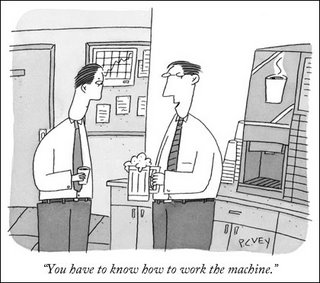
Published in The New Yorker November 20, 2006 Artist: P.C. Vey
"The dominant role of the corporation in modern society is one such form of innocent fraud, and he (John Kenneth Galbraith in "The Economics of Innocent Fraud: Truth For Our Time") explains how managers hold the real power in our system, not consumers or shareholders as the image would suggest. Despite the "appearance of relevance for owners," capitalism has given way to corporate bureaucracy--"a bureaucracy in control of its task and its compensation. Rewards that verge on larceny."
Most corporates agree with Galbraith's argument than the other way round. They are nothing but big bureaucracies. You have to know your way through the labyrinth to get anything done.
Worse, machines have joined men in this. If you know the levers, even your coffee-only vending machine can dish out beer for you!
No comments:
Post a Comment